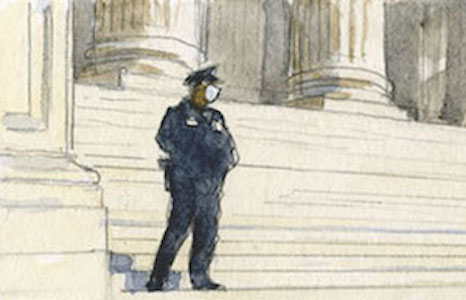
Posted Mon, November 30th, 2020 10:15 pm by Amy Howe
Less than a week after the Supreme Court lifted New York’s COVID-related limits on attendance at worship services, a Christian school in Kentucky and the state’s attorney general asked the Supreme Court on Monday to allow in-person classes at faith-based schools. Danville Christian Academy and Kentucky Attorney General Daniel Cameron, a Republican, argued that the state’s Democratic governor, Andy Beshear, has treated religious schools less favorably than “a wide assortment of secular gatherings,” ranging from college basketball games and weddings to preschools and university classrooms.
The dispute centers on a Nov. 18 order in which Beshear closed all “public and private elementary, middle, and high schools.” A second order, issued the same day, allowed other in-person activities and gatherings – such as theaters, bowling alleys, wedding venues and offices – to remain open, subject to attendance or capacity limits.
Danville Christian, a private K-12 school near Lexington with 234 students and an average class size of 12 to 17 students, went to federal court to challenge Beshear’s order as violating the Constitution’s free exercise clause. Cameron joined the school in its lawsuit. Beshear submitted an affidavit from his public health commissioner indicating that “catastrophic outbreaks” have been linked to “restaurants, weddings, funerals, and worship services” and that Beshear had decided to “close in-person settings in which COVID-19 is most likely to be transmitted.”
On Nov. 25, the district court issued an order that barred Beshear from enforcing the ban on in-person schooling “with respect to any religious private school in Kentucky that adheres to applicable social distancing and hygiene guidelines.”
Beshear went to the U.S. Court of Appeals for the 6th Circuit, asking it to put the district court’s order on hold. The court of appeals granted Beshear’s request on Sunday, concluding that Danville Christian and Cameron were unlikely to prevail because Beshear’s order was neutral and applies to all of the schools in Kentucky, both secular and religious.
Danville Christian and Cameron filed an emergency request at the Supreme Court on Monday afternoon, telling the justices that the 6th Circuit’s “application of the Free Exercise Clause is ‘demonstrably wrong’ in light of” the Supreme Court’s ruling last week in Roman Catholic Diocese of Brooklyn v. Cuomo, barring New York from enforcing attendance limits at houses of worship. In upholding Beshear’s order, Danville Christian and Cameron argue, the court of appeals considered the limits on religious schools in a vacuum, without considering the more favorable treatment that the second order gives to other, secular in-person gatherings, even though those gatherings “create a risk of significant outbreaks.” Danville Christian and Cameron paint the contrast between the gatherings that are permitted and prohibited in stark terms: “Why,” they ask, “can a 12-year-old go to the movies along with two dozen other people, but she can’t watch the Greatest Story Ever Told with a smaller group in Bible class? Why can Kentuckians cheer on their favorite NCAA basketball teams indoors, attend a size-restricted wedding, or keep up Black Friday shopping traditions, but children can’t gather for school chapel?”
The challengers’ request for an order putting the 6th Circuit’s ruling on hold goes initially to Justice Brett Kavanaugh, who is responsible for emergency requests from the 6th Circuit. Kavanaugh can act on the request himself or, as is more likely, refer it to the full court.
This article was originally published at Howe on the Court.
Recommended Citation: Amy Howe, Christian school in Kentucky asks justices to intervene in dispute over in-person classes at religious schools, SCOTUSblog (Nov. 30, 2020, 10:15 PM), https://www.scotusblog.com/2020/11/christian-school-in-kentucky-asks-justices-to-intervene-in-dispute-over-in-person-classes-at-religious-schools/


